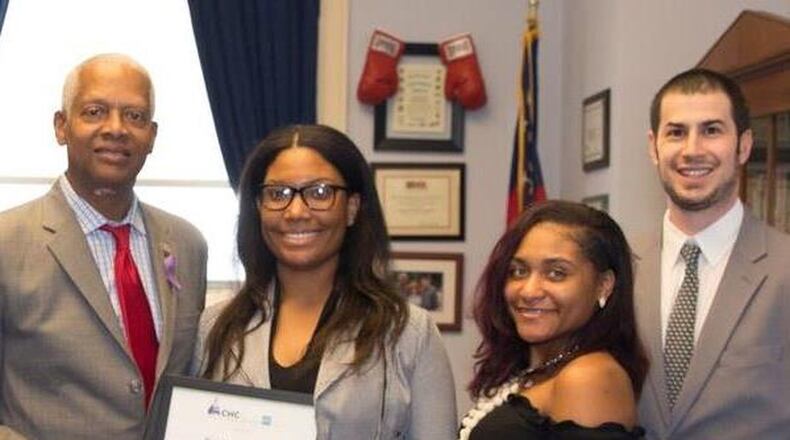Back in February, William Roth walked into his British literature class at Redan High School in Stone Mountain and instead of beginning a reading of, say, “Wuthering Heights” or “The Canterbury Tales,” he announced to his students they’d be entering the annual Stock Market Game Capitol Hill Challenge.
He was serious.
If there’s anything Roth has learned in his four years of teaching, it’s that English literature is relevant to nearly every aspect of life. It encourages rigorous thinking in understanding and analyzing a wide range of themes like sequence, character motivation, critical analysis of a plot as well as visualization of all possible actions and responses to a story.
For two years, he's led teams in the SIFMA Foundation Stock Market Game offered locally through the Georgia Council on Economic Education. Now he wanted to go national and join the Capitol Hill Challenge.
Divide yourselves into groups of three or four, he told his students.
Ten teams quickly emerged.
Shania Hinds had no knowledge of the stock market, but she knew a lot about herself. She was a leader. Instead of spending, she preferred to save. And she believed with her whole heart that “whatever the mind can conceive, it can achieve.”
“I’m going to win this,” she said to no one in particular.
Alexis Goings knew a winner when she saw one.
“I’m on your team, girl,” she recalled saying recently.
They were joined by classmates Jacarria Harris and Nehemiah Adams.
Although studies show that more black Americans are investing in the stock market, they still lag far behind whites.
With the exception of a couple of students in Roth’s mostly African-American classroom, this would be their first exposure to the stock market, investing and finance.
RELATED | Starting the money talk with kids
“We didn’t have any idea what we were getting ourselves into,” Hinds said.
Roth offered a few tactics and ideas, and one of his students, who’d actually purchased stocks, shared what he knew.
What they learned next came during hours spent scouring the internet, figuring out the ticker tape symbols and trying to figure out which stocks were best to buy, which carried the most risk, and when to sell.
According to Melanie Mortimer, president of the SIFMA Foundation, a national nonprofit dedicated to fostering knowledge of the financial markets, the Capitol Hill Challenge is one of several tools it uses to help teachers enhance economics and other instruction in the classroom and prepare students for their financial lives.
This year marks the 40th anniversary of the SIFMA Foundation’s Stock Market Game, an online simulation that allows students in grades four to 12 to purchase hypothetical securities from actual stocks, bonds and mutual funds.
More than 600,000 students participate every year. Since its inception in 1977, some 17 million students have been reached.
Its Capitol Hill Challenge, held in the spring and underwritten by Charles Schwab, matches members of Congress with schools competing nationally in the Stock Market Game. Winners receive a paid trip to Washington, D.C., to meet their member of Congress, tour financial landmarks, and learn about financial policymaking.
Since its inception in 2004, more than 4,300 matches of U.S. representatives and senators have been made with more than 116,000 students from across the country.
The Redan teams, about 35 students in all, were among them. Their match? Sen. Johnny Isakson.
RELATED | These are the 5 biggest stock market crashes in U.S. history
From the beginning, Hinds’ team rose to the top, and it remained there for nearly the entire 14 weeks of the competition.
Their strategy was simple: purchase low-priced stocks, bonds and mutual funds from the health and technology sectors. Both were growing. They couldn’t lose.
But staying on top proved more difficult than any of them had imagined. The market was moving like a roller coaster with wide swings up and down.
Hinds kept her eyes on an Albany, Calif., team.
“They made me nervous,” she said.
She and her teammates were sweating bullets and not just because their classroom was an 80-degree sauna. If you attend a Title I school, you can get used to the heat.
But this was different. Only days were left in the competition, and now the Albany team had replaced them at the top.
Roth suggested the team sell a low-performing stock, but Hinds wasn’t sure. Too big a risk, she thought.
“Miss Hinds, do something,” Roth told her. “Make a decision.”
Hinds sold but at the end of the day, it didn’t seem to improve their portfolio. They felt, well, deflated.
After a review period, Roth got the call they’d been waiting for. They’d won.
On May 23, two days before the team members were scheduled to graduate, he shared the news with Hinds.
Hinds called her teammates.
They couldn’t believe it.
“Are you playing?” Goings asked.
But this was no joke. Let’s say we call it a graduation present.
Find Gracie on Facebook (www.facebook.com/graciestaplesajc/) and Twitter (@GStaples_AJC) or email her at gstaples@ajc.com.
About the Author
Keep Reading
The Latest
Featured






